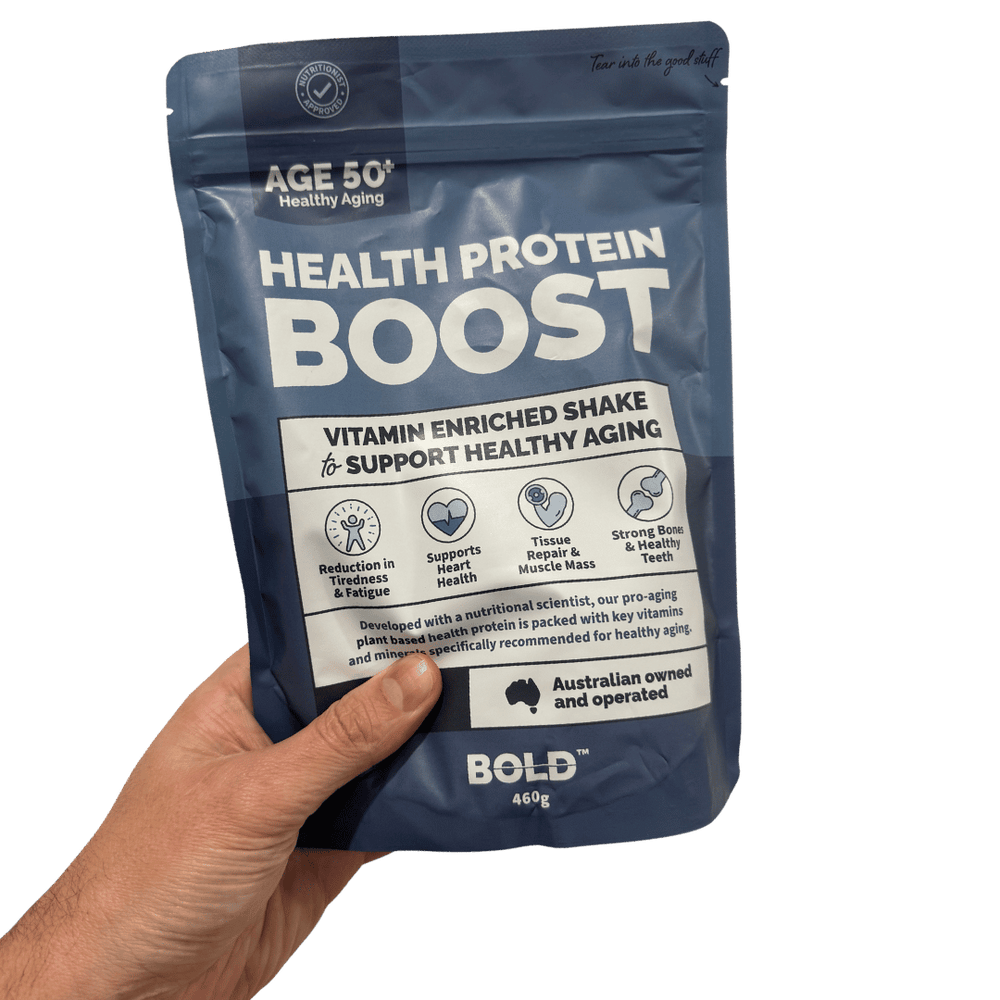How to get better sleep so you can get the most out of your day
Seven easy tips for a better night's sleep

Why is sleep so important for healthy aging?
- Sleep and aging: Why it can become an issue?
- Lifestyle Factors to improve sleep
- Maintain regular sleep pattern
- Optimise your sleeping environment
- Utilise breathing exercises
- Exercise and timing
- Meal size before bed
- Caffeine and alcohol intake
- Supplements
Sleep is an essential part of life! Most adults need at least 7-9 hours of quality sleep each night. But unfortunately, as we age, good quality sleep becomes more difficult to achieve. In fact, as much as 50% of people over 50 report at least one chronic sleep symptom such as difficulty falling asleep, staying asleep or waking early.
It's important for us to work on getting better sleep because it significantly impacts our overall health. Poor sleep is linked to an increased risk of heart issues, mental health problems, diabetes, and obesity. So in this post will discuss why sleep becomes an issue with age, and some lifestyle and diet changes you can make to better your sleep.
Sleep and aging: Why it can become an issue?
There are a number of reasons why older adults have difficulty sleeping. As we age our body clock and sleep cycles change too. We spend less time in deep, restful sleep and more time in light sleep. This is because the body's production of melatonin (a hormone that helps regulate our sleep/wake cycle) decreases with age.
The body also tends to release melatonin earlier in the day which is why older people tend to fall asleep earlier in the evening and wake earlier in the morning.
In addition to these natural changes, there are a number of other factors that can contribute to sleeplessness as we get older. Some medical conditions, medications, life stressors, reduced physical activity, and hormonal changes can all affect sleep.
Lifestyle Factors to improve sleep
There are a few things we can do to help maintain better sleep as we get older. These changes are to help create an environment that is inductive for sleep.
1. Maintain regular sleep patterns
One of the best ways to better sleep is by maintaining a regular sleeping pattern. Try to go to bed and wake up at about the same time each day, including weekends.
This will help set your circadian rhythm (the internal clock that controls when we feel sleepy or wide awake). The body will naturally have a boost of the cortisol hormone (a hormone that helps us wake up) in the morning. Then at night, there should be a decrease in cortisol and an increase in melatonin (our sleepy hormone). So by keeping to a regular sleep pattern, and exposing yourself to fresh sunlight first thing in the morning and during daylight hours, you can help this flow of hormones.
In some instances, doctors may prescribe melatonin medication to help support falling asleep at night.
Now when it comes to napping, it's recommended to avoid having them too close to bedtime. If you need a nap during the day try and have them in the morning or early afternoon and for not too long.
2. Optimise your sleeping environment
Take a little time to ensure your sleeping environment is optimal to help you get better sleep.
- Keep the bedroom cool: The ideal sleeping temperature is between 15 to 19 Celsius.
- Create a dark room: Blackout curtains are extremely helpful at blocking out light from street lamps outside the house as well as early morning sunlight when trying to sleep during summertime. You'll find you fall asleep much faster because there aren't any bright lights disrupting melatonin production in the brain once darkness falls!
- Ensure the room is quiet and calm: If there are noises that keep you awake, try and find ways to reduce or block them out. Whether this is through earplugs, a noise machine, or a white noise app on your phone.
- Remove electronics from the room: The blue light emitted from screens suppresses melatonin production which can make it difficult for us to fall asleep. So it's best to remove all electronics from the bedroom (including phones, TVs, laptops etc).
- Get rid of clutter: A cluttered environment can cause anxiety and stress so take some time to tidy up your bedroom! This will help promote relaxation and better sleep.
- Use breathable bed linen & pyjamas: Another thing that can help improve our sleep quality is having comfortable bedding and clothes. Use good quality, breathable fibres such as organic cotton or bamboo.
3. Utilise breathing exercises or mindful meditation
Breathing exercises and mindful meditation can be great ways to relax the mind and body before bed. They help to clear the head of any thoughts that may be keeping us awake, and promote better sleep.
There are plenty of guided breathing exercises or mindfulness meditations available on Youtube or apps such as Headspace or Calm.
Alternatively, you could try a simple mindfulness exercise like the one we discussed in our previous blog, "The Benefits of Practising Mindfulness: How to Get Started and Stay Motivated".
4. Exercise and timing
Regular exercise is extremely beneficial for our overall health, including our sleep quality. Exercise releases endorphins (the “happy hormones”) which make us feel good, help improve our moods and decreases stress levels all of which can lead to better sleep.
We should aim to accumulate at least 30 minutes of exercise per day, which can be broken up into short bursts throughout the day if needed. However, exercising too close to bedtime may actually have negative effects on our sleep. This is because our bodies release cortisol (waking hormone) after exercising which can keep us awake. It also causes a rise in our core body temperature which can impact sleep, so try and avoid exercise during this time frame.
5. Meal size before bed
How much you eat before bed can impact your sleep. It's recommended you don't eat too big of a meal too close to bedtime. This is because our digestive system will be working hard to break down the food which can be disruptive to sleep.
6. Caffeine & alcohol intake
Caffeine and alcohol should be avoided before bed as they are both stimulants that can keep us awake. Some people may think alcohol helps them get better sleep but this isn't quite true. Although some people may fall asleep quicker, their quality of sleep throughout the night is worse. This is because alcohol can disrupt our circadian rhythm (our internal body clock) preventing us from falling into deeper stages of sleep. Try not to drink within three hours before bedtime or even better have some alcohol-free nights!
If you struggle to fall asleep, avoid drinking coffee in the late afternoon or evening. Use calming herbal teas instead such as chamomile, peppermint tea, lavender or lemon balm.
7. Supplements
The percentage of elderly people that use sleeping medication is quite high. It is estimated that around 15.7% of people over the age of 65 years old take benzodiazepines to assist with sleep. The problem with this however is that it also leads to an increased risk of falls and incidences around the home.
If you are wanting to explore more natural options to assist with sleep, there are a variety of supplements that may be suitable. These include magnesium, kava, passionflower, valerian, ziziphus, withania and schisandra. It is important however that you speak with your doctor or pharmacist first, before making any changes to your medical regime.
Summary
Sleep is an essential part of life that we often struggle to get enough of. You may be losing sleep because of age-related conditions, health problems, or your environment. But, it’s never too late to start getting better sleep. If you are one of the many people who has trouble falling asleep or staying asleep. The 6 tips we provided should be able to help with improving your sleep patterns and ultimately lead to better health for both yourself and those around you. Try out some new strategies tonight!

References
- https://www.ncbi.nlm.nih.gov/pmc/articles/PMC5991956/
- https://www.sleephealthfoundation.org.au/older-people-and-sleeping.html
- https://www.sleepfoundation.org/circadian-rhythm
- https://www.betterhealth.vic.gov.au/health/conditionsandtreatments/sleep-hygiene#improve-your-sleeping-environment
- https://www.cdc.gov/bloodpressure/sleep.htm
- https://www.headspace.com/meditation/sleep
- https://www.hopkinsmedicine.org/health/wellness-and-prevention/exercising-for-better-sleep
- https://adf.org.au/reducing-risk/alcohol/alcohol-guidelines/
----------------------------------------------------------------------------------------------------------
Medical Disclaimer
The information provided in this blog post is for general information only, it is not intended as medical advice. For medical advice please consult with a qualified medical professional who is familiar with your individual medical needs.


